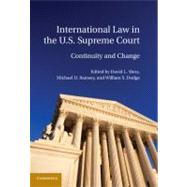
Note: Supplemental materials are not guaranteed with Rental or Used book purchases.
Purchase Benefits
What is included with this book?
| List of Contributors | p. xi |
| Table of Cases | p. xix |
| Acknowledgments | p. xxxv |
| Introduction | p. 1 |
| From the Founding to the Civil War | |
| International Law in the Supreme Court to 1860 | p. 7 |
| From the Civil War to the Turn of the Century | |
| Treaties in the Supreme Court, 1861-1900 | p. 55 |
| Customary International Law in the Supreme Court, 1861-1900 | p. 89 |
| International Law as an Interpretive Tool in the Supreme Court, 1861-1900 | p. 124 |
| A Social History of International Law: Historical Commentary, 1861-1900 | p. 164 |
| From the Turn of the Century to World War II | |
| Treaties in the Supreme Court, 1901-1945 | p. 191 |
| Customary International Law in the Supreme Court, 1901-1945 | p. 225 |
| International Law as it an Interpretive Tool in the Supreme Court, 1901-1945 | p. 257 |
| Varieties and Complexities of Doctrinal Change: Historical Commentary, 1901-1945 | p. 285 |
| From World War II to the New Millennium | |
| Treaties in the Supreme Court, 1946-2000 | p. 317 |
| Customary International Law in the Supreme Court, 1946-2000 | p. 353 |
| International Law as an Interpretive Tool in the Supreme Court, 1946-2000 | p. 380 |
| Global Power in an Age of Rights: Historical Commentary, 1946-2000 | p. 416 |
| International Law in the U.S. Supreme Court in the Twenty-First Century | |
| Introductory Note | p. 443 |
| Treaties After 2000 | |
| Main Essay - Medellin and Sanchez-Llamas: Treaties from John Jay to John Roberts | p. 451 |
| Response Essay - The Benefits of Avoiding Conflicts between the Constitution and International Law | p. 465 |
| Response Essay - Medellin and the Passive Vices | p. 472 |
| Customary International Law After 2000 | |
| Main Essay - Sosa and the Derivation of Customary International Law | p. 481 |
| Response Essay - ôCheap Talkö about Customary International Law | p. 494 |
| Response Essay - History, Ideology, and Erie v. Tompkins | p. 499 |
| International Law and Constitutional Interpretation After 2000 | |
| Main Essay - International Law and Constitutional Interpretation in the Twenty-First Century: Change and Continuity | p. 507 |
| Response Essay - Why Constitutional Comparativism Is Different: A Response to Professor Tushnet | p. 518 |
| Response Essay - Judicial Dialogue in Roper: Signaling the Court's Emergence as a Transnational Legal Actor? | p. 523 |
| International Law and Statutory Interpretation After 2000 | |
| Main Essay - Empagran's Empire: International Law and Statutory Interpretation in the U.S. Supreme Court of the Twenty-First Century | p. 533 |
| Response Essay - Loose Canons: International Law and Statutory Interpretation in the Twenty-First Century | p. 547 |
| Response Essay - Empagran; Empire Building or Judicial Modesty? | p. 553 |
| International Law and the War on Terror | |
| Main Essay - The Supreme Court, the War on Terror, and the American Just War Constitutional Tradition | p. 561 |
| Response Essay- Constitutional Resolve in a World Changed Utterly | p. 575 |
| Response Essay - Judicial Imperialism and the War on Terror Cases | p. 582 |
| Conclusion | |
| Continuity and Change over Two Centuries | p. 589 |
| Index | p. 607 |
| Table of Contents provided by Ingram. All Rights Reserved. |
The New copy of this book will include any supplemental materials advertised. Please check the title of the book to determine if it should include any access cards, study guides, lab manuals, CDs, etc.
The Used, Rental and eBook copies of this book are not guaranteed to include any supplemental materials. Typically, only the book itself is included. This is true even if the title states it includes any access cards, study guides, lab manuals, CDs, etc.